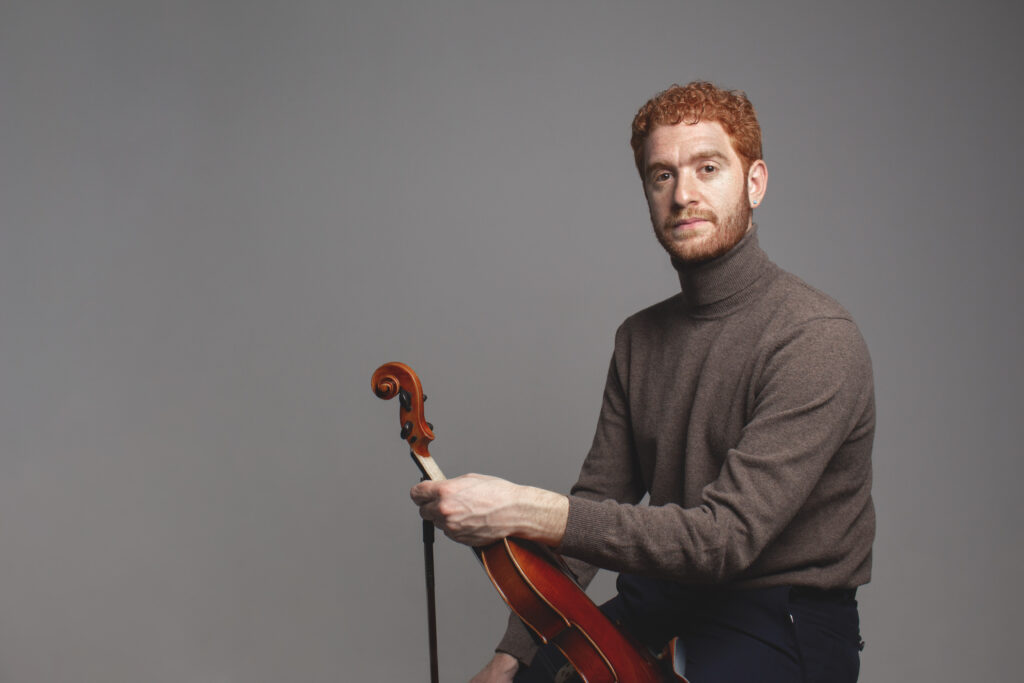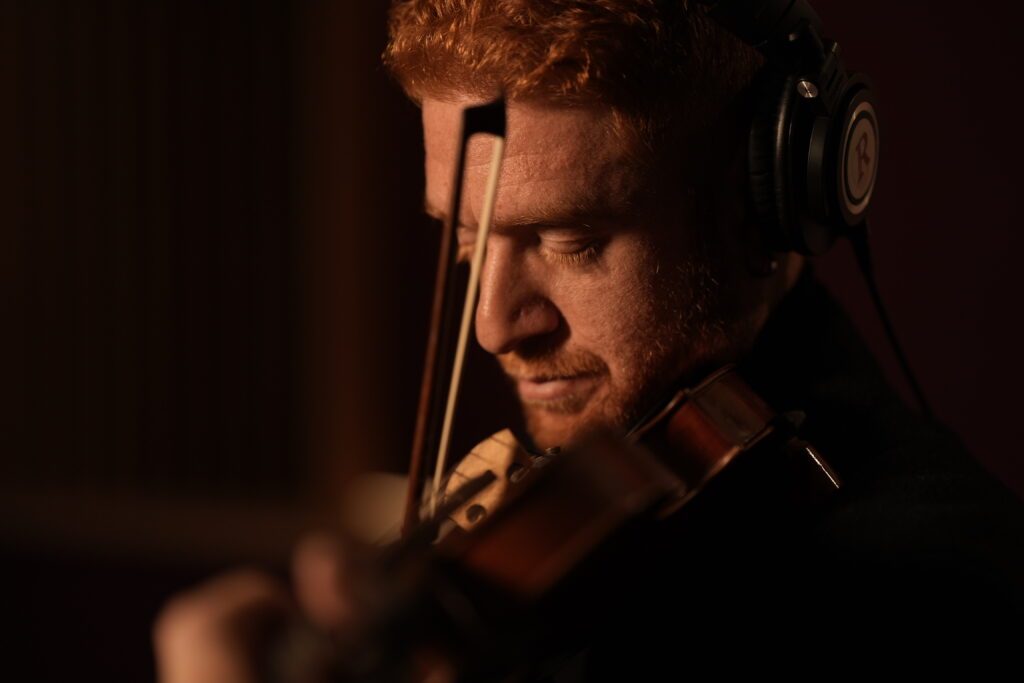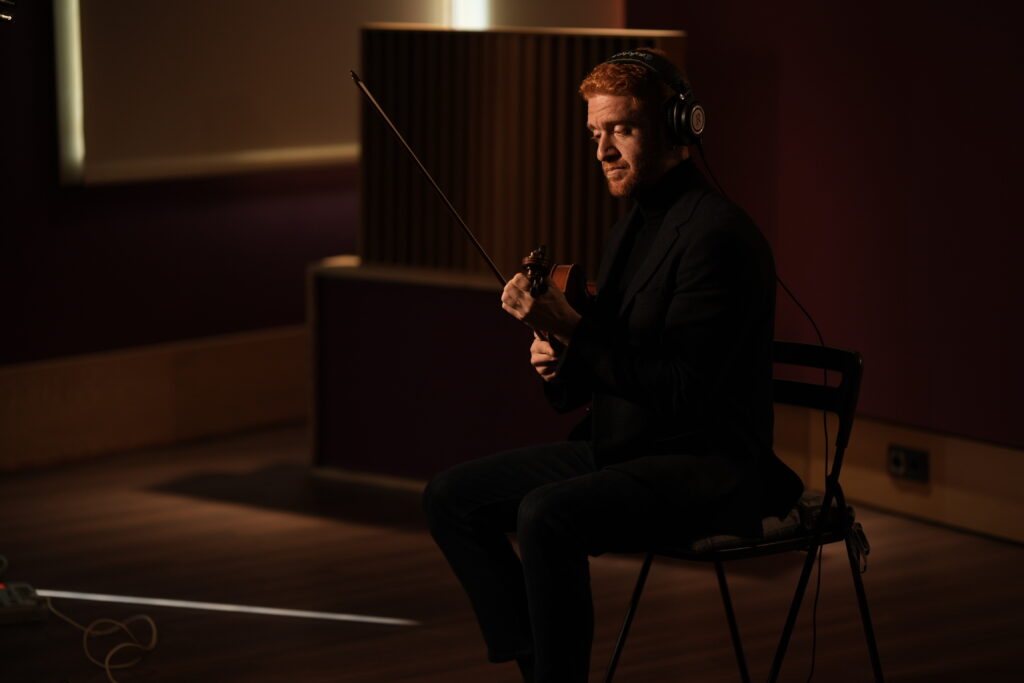"Music Connects People to Identity": 40 Minutes with Layth Sidiq
By: Layan Srour / Arab America Contributing Writer

Layth Sidiq is a Grammy-nominated violinist, composer, educator, and the artistic director of the New York Arab Orchestra. Born in Iraq and raised in Jordan, in a musical household that welcomed artists from across the world, he began his violin studies at the age of four. Trained in Western classical music and later shaped by his studies at Berklee College of Music, he blends his Arab heritage with performance, education, and community service. His work reflects a deep commitment to connecting music, community, and identity through sound.
Can you tell me a little bit about your upbringing and how it influenced your journey into music?
I grew up in a musical household—both my parents went to music school, though my father pursued it more seriously than my mother. It wasn’t just a musical home; it was also a gathering place for many artists. My father, Mohammed Sidiq, started as a piano professor and is now the director of the Amman National Music Conservatory (NMC). In the 90s, when I was growing up, any artist who came to Jordan to perform with the NMC Orchestra was invited to our house as a gesture of welcome, to have Middle Eastern cuisine, good conversation, and then a spontaneous performance.
Being in that environment and playing at the conservatory from the age of four was the beginning of my journey into music as a career. I had my first “serious” performance at age 11, playing in front of Jordanian royalty with the European Chamber String Orchestra. That was my first real exposure to performing on stage at a high level.
How did you go from a violin student in Amman to the director of the New York Arab Orchestra?
At 16, I moved to the United Kingdom to study at Chetham’s School of Music, which focused on Western European classical music. That was the tradition I had studied on the violin, even though I was growing up in the Middle East. During my time in the UK, I started questioning my future: “Do I stay in the UK? Do I apply to colleges here, or should I try something different?”
At that time, Berklee College of Music was holding auditions in Jordan, so I decided to give it a shot. This audition was different. Yes, it included elements of Western music and Jazz, but they also asked us to improvise and play something from our own culture. Honestly, I was shocked. I didn’t know I was able to express my culture on my instrument.
I received a full-tuition scholarship! Berklee challenged me and gave me the space to explore. Completing both my bachelor’s and master’s degrees there allowed me to understand my identity as an Arab musician. I left behind the European pedagogy; it stayed in my technique, but my vision of what music-making could be completely shifted. At Berklee, I studied with the world-renowned Simon Shaheen, who has been a major influence on me and countless musicians worldwide.
After completing my master’s at the Berklee Global Jazz Institute, I directed the Tufts Arab Music Ensemble for about four years.
Sadly, during COVID-19, Bassam Saba, the co-founder of the New York Arab Orchestra, passed away. The board reached out and asked me to direct the orchestra. I accepted the opportunity with honor. It felt like the right thing to do—to continue his legacy and vision. That’s how I stepped into the role in 2021.

Is there a specific story, person, or experience that still sticks with you? Something that really shaped you as an artist?
A big part of my work is community service, as well as performance and education. I’ve collaborated with many NGOs across the Middle East that serve refugees and displaced communities. One example is the Kayany Foundation in Lebanon, founded by Nora Joumblatt. This foundation offers quality education for Syrian refugee children and youth, especially those in the Beqaa Valley.
This was right after I graduated. I wanted to perform everywhere. With support from Tufts University and Berklee, we purchased percussion instruments and gifted them to the schools. The instruments were explicitly purchased from Syrian instrument makers to support the community further.
Some of these children are in incredibly difficult situations, but the look in their eyes meant everything to me. The way they internalized the music of their identity was powerful, especially because many of them feel that identity has been stripped away by displacement.
That experience taught me that music isn’t just about composing, performing, or teaching—it’s about connecting with people who feel lost, telling their stories, and reaching out to anyone who has been displaced or lost their home. When we represent, it gives others a chance to connect to who they are and what they do and to feel a sense of community. It was a deeply emotional experience and a confirmation that I was on the right path.
Another moment that shaped me was my performance in Mosul, a city in northern Iraq. I was invited to perform at the Mosul Traditional Music Festival, hosted by Action for Hope in partnership with UNESCO. It was my first time returning to Iraq since my parents left in the early 90s. Mosul is also the city from which my father is originally from.
I had never known the feeling of home until I stepped on that stage and heard people speaking in my accent. That may sound simple, but it was profound. We often take for granted being around our dialect, people, and culture. I had never experienced that in my life. That moment, too, confirmed that I was on the right path.
Have you faced any challenges as an Arab artist in the music industry?
There were artists before us, like Simon Shaheen, Bassam Saba, and others, who laid the foundation for us to succeed in the U.S. But one ongoing challenge we face is the colonization of our music. In academic spaces, festivals, and workshops, we’re often brought in to check a “diversity” box.
I don’t just blame others. We, as artists, also need to reflect on how we represent ourselves. We need to create our own spaces, push our own artistic agendas, and stop waiting for someone to always invite us.

What’s your agenda? What message do you want to convey to your audience?
We have an incredible legacy of performers within our tradition; artists like Umm Kulthum, Mohamed Abdel Wahab, Fairouz, and many other contemporary artists. But what we lack, and what we need to push forward, is research. We need to showcase the diversity of Arab music from an educational perspective, not just performance.
And not just between countries, but within them. You can’t talk about Iraqi music without exploring the differences and similarities between northern Iraq and the south. For the music to do its role, there needs to be effort in research and education. If you only focus on performance, the audience will not know how or what to appreciate what is being performed.
That’s why so much of my work is rooted in education. I rarely give a concert without an educational component—whether it’s a workshop or a pre-concert talk. I explain the piece, the instrumentation, and the improvisational elements. That is a must for any performance—we can’t expect everybody to understand.
What advice would you give to Arab Arabs or Arab Americans aspiring to enter the music world?
Don’t be afraid to seek guidance and ask questions. There are so many experienced people who are ready to share and guide you. All the resources that you need are there. There’s an Arab community in music in almost every state. Boston, New York, Detroit, Houston, Los Angeles—you name it, it’s there. There’s so much out there. It might feel lonely at first, but ask, and you’ll find it.
About the Article and Author: Layan Srour, a Lebanese musician based in Detroit, Michigan, is passionate about blending her culture through music, research, and education in the United States. 40 Minutes With is a weekly feature where Layan interviews an Arab American musician, exploring their journey through music and culture in America. Connect with Layan on Instagram, Facebook, LinkedIn, or via email.
Want more articles like this? Sign up for our e-newsletter! Check out our blog here!








